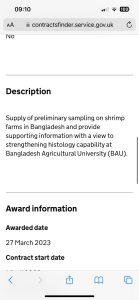Wasteful government spending examples UK
Waste across the UK government is rife. Whilst hard working UK taxpayers face the highest taxes in decades government departments, Quangos and civil servants continue with wasteful government spending and vanity projects that are at odds with official rhetoric about black holes, high debt and need for more taxes.
22nd May 2023
British Taxpayers spent £50,000 to study “Shrimp health in Bangladesh”
Contract was Awarded to Bangladesh Agricultural Universit by the FCDO


2025 (Mar 17) – Whitehall procurement‑cards spending reaches £675 m over five years; crackdown announced to cancel ~10,000 cards.
Dec 11, 2024 – Ministers spent nearly £117,000 on leather stationery (folders, red‑boxes, locks) over five years.
Feb 5, 2025 – Public Accounts Committee found nearly £100 m wasted on failed asylum‑housing projects: Northeye site, Bibby Stockholm barge, RAF Scampton, Linton‑on‑Ouse.
2007–2029 – NHS expected peak annual PFI payments of £2.7 b; trusts paid billions in profit to PFI firms.
COVID‑19 Related Waste
2020 – Eat Out to Help Out scheme subsidised £849 m in meals; later linked to increased COVID‑19 spread.
2020–2022 – Up to £15 b of PPE, tests and vaccines written off as unusable or unsuitable; including £1 b of poor‑quality PPE bought via VIP lane.
January 2022 – DHSC officially wrote off £8.7 b in PPE that was unusable or lost; additional £3.6 b unlocated.
Throughout 2020–21 – £10.5 b of pandemic contracts (58%) awarded without competitive tender; cronyism highlighted.
May 2024 – MoD payroll hack: personnel and bank data compromised. Attributed (tentatively) to China.
Local Government Financial Failures (Section 114 Notices)
Feb 2, 2018 – Northamptonshire County Council issues first Section 114 notice: projected £10 m deficit. Second notice in July 2018.
Nov 17, 2000 – Hackney Council issues Section 114 notice: £15.5 m shortfall in 2000–2001.
Nov 11, 2020 – Croydon Council first Section 114 notice: £60 m overspend, £1.5 b debt. Second notice followed Dec 2 2020.
Sept 5, 2023 – Birmingham City Council issues Section 114: £87 m deficit forecast rising to £165 m due to costs of equal pay and IT failures.
Nov 29, 2023 – Nottingham City Council issues Section 114: £23 m overspend predicted in 2023–24 year.
Major Public Inquiry Costs
Since devolution until recently – Scottish Government spent over £215 m on public inquiries (~20,000 inquiry‑days), including the Child Abuse Inquiry costing £91 m so far.
Here are 25 dated examples of significant UK government waste‑of‑money incidents, focusing on confirmed losses and official criticism. Dates refer to the year or specific date when the issue became known or was reported:
—
Major Waste & Mismanagement Cases
1. 1995 – Ordering eight Boeing Chinook HC3 helicopters for £259 m; they entered service 20 years late and cost ~£500 m. Described as “one of the most incompetent procurements of all time.”
2. 2010–2011 – Nimrod MRA4 maritime patrol aircraft programme scrapped after £3.4 b spent, plus undisclosed termination costs.
3. 2005–2013 – Sellafield nuclear decommissioning costs ballooned from £25 b to £117 b by 2015; total cleanup estimated over £70 b.
4. 2010s – Private Finance Initiative (PFI) legacy created £267 b future obligations; widely criticized as poor value-for-money.
5. 2016 – PFI schools in Edinburgh failed to open due to structural issues, built in the 1990s under PFI.
6. 2017–2029 – NHS expected peak annual PFI payments of £2.7 b; trusts paid billions in profit to PFI firms.
COVID‑19 Related Waste
7. 2020 – Eat Out to Help Out scheme subsidised £849 m in meals; later linked to increased COVID‑19 spread.
8. 2020–2022 – Up to £15 b of PPE, tests and vaccines written off as unusable or unsuitable; including £1 b of poor‑quality PPE bought via VIP lane.
9. January 2022 – DHSC officially wrote off £8.7 b in PPE that was unusable or lost; additional £3.6 b unlocated.
10. Throughout 2020–21 – £10.5 b of pandemic contracts (58%) awarded without competitive tender; cronyism highlighted.
11. May 2024 – MoD payroll hack: personnel and bank data compromised. Attributed (tentatively) to China.
Local Government Financial Failures (Section 114 Notices)
12. Feb 2, 2018 – Northamptonshire County Council issues first Section 114 notice: projected £10 m deficit. Second notice in July 2018.
13. Nov 17, 2000 – Hackney Council issues Section 114 notice: £15.5 m shortfall in 2000–2001.
14. Nov 11, 2020 – Croydon Council first Section 114 notice: £60 m overspend, £1.5 b debt. Second notice followed Dec 2 2020.
15. Sept 5, 2023 – Birmingham City Council issues Section 114: £87 m deficit forecast rising to £165 m due to costs of equal pay and IT failures.
16. Nov 29, 2023 – Nottingham City Council issues Section 114: £23 m overspend predicted in 2023–24 year.
Overspends and Procurement Failures
17. 2025 (Mar 17) – Whitehall procurement‑cards spending reaches £675 m over five years; crackdown announced to cancel ~10,000 cards.
18. Dec 11, 2024 – Ministers spent nearly £117,000 on leather stationery (folders, red‑boxes, locks) over five years.
Asylum‑Seeker Housing Failures
19. Feb 5, 2025 – Public Accounts Committee found nearly £100 m wasted on failed asylum‑housing projects: Northeye site, Bibby Stockholm barge, RAF Scampton, Linton‑on‑Ouse.
Major Public Inquiry Costs
20. Since devolution until recently – Scottish Government spent over £215 m on public inquiries (~20,000 inquiry‑days), including the Child Abuse Inquiry costing £91 m so far.
Accumulated Waste Totals
21. June 2024 – Best for Britain tracker estimates £131 b of “scandalous spending” since the last election (up to June 2024).
22. 2024 report – Estimated over £125 b wasted since 2019.
23. 2023 Labour dossier – 100 examples of departmental waste under Sunak from 2019–22 totalling up to £26.8 b in write‑offs.
24. 2023 PAC report – Government risked and lost “unacceptable” billions through Covid contracts and fraud.
IT/Rural Payments Agency
25. 2005–2009 – Rural Payments Agency IT project overspent: original estimate £75.8 m, soared to £350 m and later total cost £680 m.
—
These examples span decades, from early misguided procurements in the 1990s to repeated mismanagement during COVID, local government bankruptcies, and routine civil‑service waste. Taken together they reflect persistent structural issues in procurement, oversight, and value‑for‑money across UK governance.
These examples span decades, from early misguided procurements in the 1990s to repeated mismanagement during COVID, local government bankruptcies, and routine civil‑service waste. Taken together they reflect persistent structural issues in procurement, oversight, and value‑for‑money across UK governance that DOGE is highlighting.
